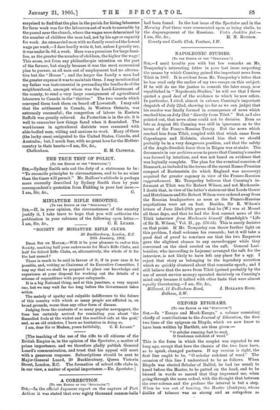SIR; I need trouble you with but few remarks on
Mr. Temperley's interesting letter in your last issue respecting the means by which Canning gained the important news from Tilsit in 1807. It is evident from Mr. Temperley's letter that he has read only the earlier of my two essays on this subject. If he will do me the justice to consult the later essay, now republished in " Napoleonic Studies," he will see that I there quoted a good deal of the evidence to which he now refers. In particular, I cited, almost in extenso, Canning's important despatch of July 22nd, showing (as far as we can judge) that his resolve was finally formed in consequence of news which reached him on July 21st " directly from Tilsit." But, as I also pointed out, that news alone could not be decisive. Even so late as August 4th Canning was still in ignorance as to the terms of the Franco-Russian Treaty. But the news which reached him from Tilsit, coupled with that which came from Copenhagen and Holstein, showed him that we should probably be in a very dangerous position, and that the safety of the Anglo-Swedish force then in Rilgen was at stake. The documents in our archives seem to prove that Canning's resolve was formed by intuition, and was not based on evidence that was logically complete. The plan for the eventual coercion of Denmark, as included in the terms of the recent Russo-Prussian compact of Bartenstein (to which England was accessory) acquired far greater cogency in view of the Franco-Russian rapprochement. Mr. Temperley believes that Canning's in- formant at Tilsit was Sir Robert Wilson, and not Mackenzie. I doubt that, in view of the latter's statement that Lords Gower and Hutchinson and Sir Robert Wilson were ordered away from the Russian headquarters as soon as the Franco-Russian negotiations were set on foot. Besides, Sir R. Wilson's letters of June 22nd-28th prove that he (W.) was at Memel all those days, and that he had the first correct news of the Tilsit interview from Mackenzie himself (Randolph's "Life of Sir R. Wilson," Vol. II., pp. 276-85). This is surely decisive on that point. If Mr. Temperley can throw further light on this problem, I shall welcome his research ; but it will take a good deal of proof to convince me that the two Emperors gave the slightest chance to any eavesdropper while they conversed on the shed erected on the raft. General Lari- boisiere, who (according to Lejeune) arranged the raft for the interview, is not likely to have left any place for a spy. I reject that story as belonging to the legendary accretion which so quickly clustered about that romantic epoch ; and I still believe that the news from Tilsit (gained probably by the use of secret service money) operated decisively on Canning's mind only because it tallied with other facts that were almost equally threatening.—I am, Sir, &c.,
Bitterest, 11 Endlesham Road,
J. HOLLAND Ross.
Balham, S.W.
OXFORD EPIGRAMS.






































 Previous page
Previous page